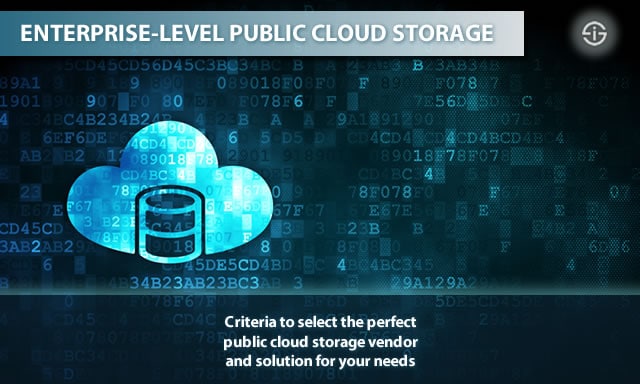One of the main use cases for public cloud computing is storage. Gartner offers some useful guidelines on how to choose an enterprise-level cloud storage provider. But don’t forget that providers need to work together effectively too.
While most public cloud storage providers have tended to target developers and SMEs with reasonably standardized offerings, several leading ICT companies are competing for enterprise customers. So as a buyer, how do you choose a public cloud storage provider? What are the capabilities that enterprise-level buyers should be looking for? Gartner offers some useful guidelines.
The research firm defined six Critical Capabilities which it deemed relevant to assessing an enterprise-level public cloud storage offering.

Enterprise-level public cloud storage offering assessment: 6 critical capabilities
These critical capabilities are:
- Accessibility (the ease with which customers can connect to the service, covering options such as WAN optimization and on-premises integration services),
- Manageability (the ease of managing, monitoring and auditing the service through simple Web interfaces),
- Price (competitiveness and simplicity of pricing),
- Resiliency (systems for guaranteeing uptime and disaster recovery),
- Security & Compliance (all manner of security options such as identity management, access control, encryption mechanisms, etc.), and
- Value-Added Services (complimentary services such as computing services, archiving, hybrid cloud services, industry specific offerings, custom SLAs and consulting services).
Public cloud storage use cases
Important is that each of these capabilities needs to be assessed in context of how you, as an enterprise customer, intend to use public cloud storage services.
In that regard Gartner outlined four different use cases:
- Primary storage (data delivery for operational activities such as employee files shares, SaaS , application data, etc. – ease of access is especially important here),
- Backup (similar to on-premises storage but with better economics),
- Archive (long-term storage of data that is infrequently accessed – reliability and compliance are especially important here) and
- Content distribution (similar to primary storage but regional specificity is important here to optimize content availability to a dispersed set of users).
Gartner used this framework to evaluate 10 providers of public cloud storage services. Two interesting conclusions stand out.
- Firstly, nearly all the evaluated providers compare pretty evenly on price, security and resiliency. But the top three stand out because they score better on Value-Added Services, Accessibility and Manageability. According to Gartner, these capabilities are the key differentiators for competing in the enterprise market.
- Secondly, the rankings hardly differed across the four use cases, implying that none of the evaluated offerings are particularly specialized in one or more Use Cases.
In conclusion: selecting the right public cloud storage solution for your needs
So what to make of this? Gartner’s advice is to select providers who offer a complete solution, including the support and service that enterprise customers need and are accustomed to.
Enterprise customers need to plan for a long-term relationship with the provider (as is the case with traditional storage vendors). In that regard customers should develop a two-year road map for the required critical capabilities and match this to the provider’s current capabilities and road map. Obviously this is in addition to assessing the partner’s financial viability and track record.
Top image: Shutterstock – Copyright: Maksim Kabakou – All other images are the property of their respective mentioned owners. Blog by Frank Boermeester, originally posted on Let’s Talk, the former blog of BT Global Services.






